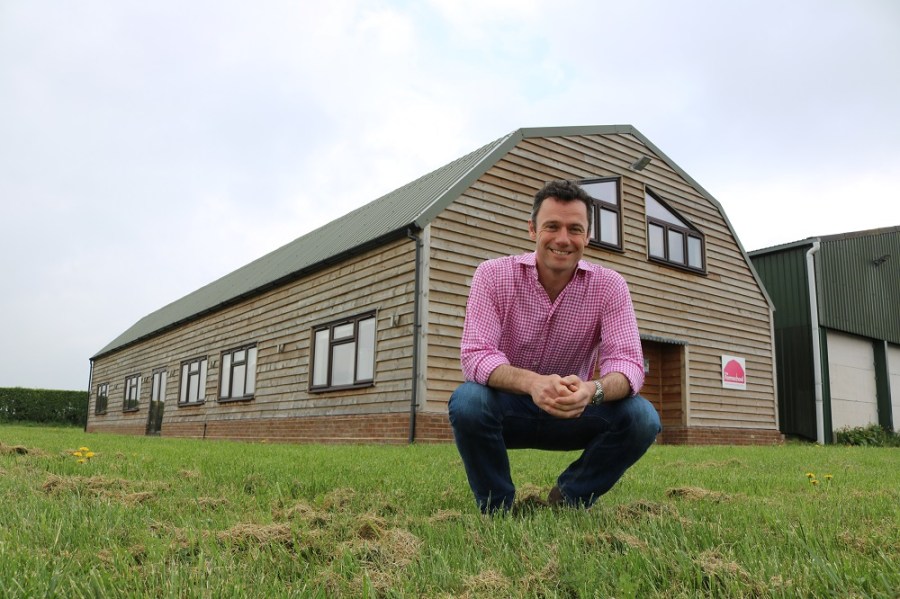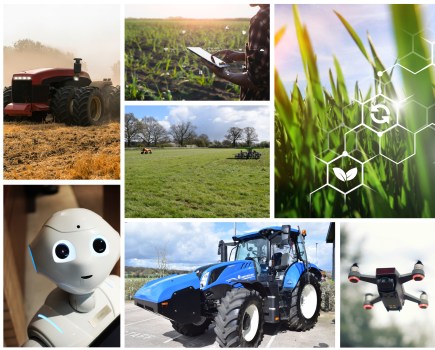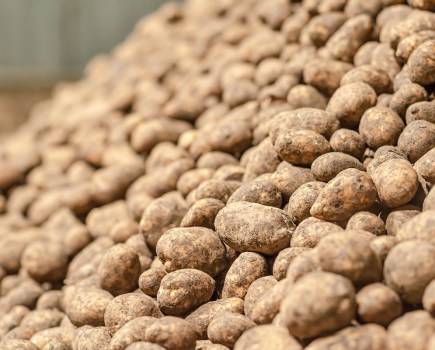Determined to bridge the disconnect the general public has with farming and the countryside, Ian Pigott was the driving force behind Open Farm Sunday. Ten years on, CPM visits to find out what’s been learned.
That’s our brand and our selling point – if we don’t look after it, someone else will use it for their own gain to our detriment.
By Tom Allen-Stevens
The curious thing about Ian Pigott’s farm at Thrales End, near Harpenden, Herts, is the coded security gate you have to negotiate when you arrive.
It’s not odd that all the farm gates are kept carefully locked – located close to the M1 and M25, the farm’s on the urban fringe. What’s curious about it is there’s probably no other farmer in the UK who has done more to open the farm gate on British Agriculture, welcome people in and show them how their food is made and the countryside cared for.
Trust in farmers
“Fundamentally people want to trust farmers,” he says. “I believe they do trust us – they can see that we’re hard-working and honest. But that’s our brand and our selling point – if we don’t look after it, then someone else will use it for their own gain to our detriment.”
It was to bridge the “massive disconnect” between farmers and the general public that drove Ian Pigott ten years ago to help set up Open Farm Sunday with LEAF (Linking Environment And Farming). On top of this, there are now up to 3500 schoolchildren per year who come to his own farm, which has a purpose-built facility called The Farmschool. The farm’s also recently embarked on a project with nearby Rothamsted Research to explore the role of soil health in an arable farming system, following its move to direct drilling and cover crops.
But the credit for these achievements goes to the key farm staff, he insists. Assistant farm manager Alex Goodge and Terry Field in charge of field operations have pioneered the crop-establishment system that revolves around a new CrossSlot drill. Office manager Vanessa Connor and Ian Pigott’s wife Gillian run the Farmschool.
“If there’s an innovation here, it’s the positive implementation of new ideas and concepts. Without a team of key people to action an innovative idea, then it’s no more than a pipedream,” he says.
This pipedream started around 15 years ago. At the time, he was working in the City broking tropical oils. “I was born and brought up on a farm, and studied agriculture at University. But I was bowled over by the negative view towards farming in the media,” he recalls.
“What struck me most was that my own colleagues in London – educated, intelligent people – had such a poor opinion of British Agriculture and were happy to accept this inaccurate portrayal. What was clear was that the farming industry was doing an appalling job of addressing the problem.”
He figured the change required was through education, so when he quit his job in the City and came back to farming, he decided to find out what could be done. “I went on a Nuffield scholarship to see how they address this issue in other countries. My research focused on Denmark, Canada and the US.”
In advanced economies, such as the UK, the general public is 5-6 generations removed from agriculture, he argues
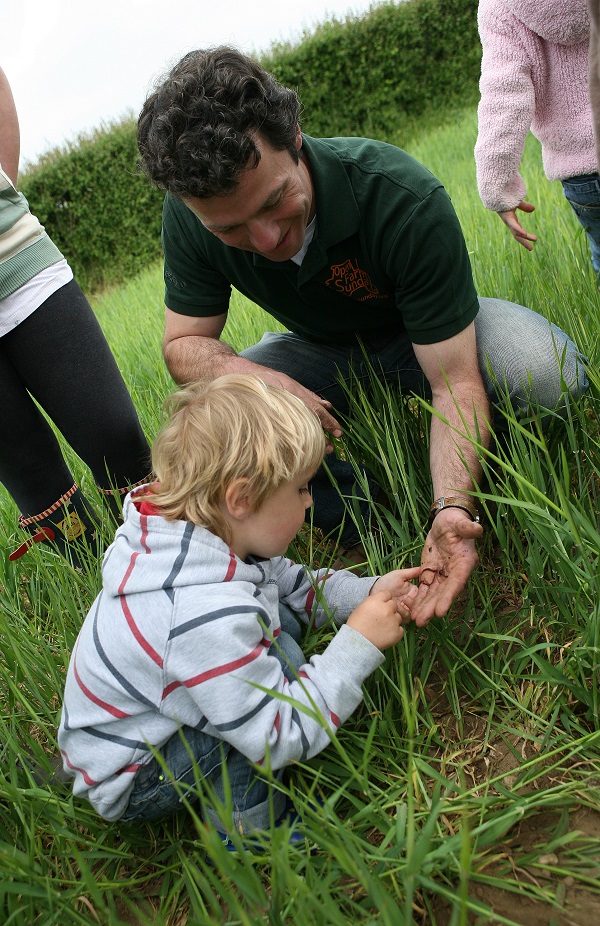
In Pigott has been keen to bridge the “massive disconnect” between farmers and the general public.
– hence the disconnect. What he found in the US, however, was a proactive effort to bring agriculture into the classroom.
“Organisations such as Future Farmers of America and 4-H are very active in the US. While in school, every child has access to farming via their state-run Agriculture in the Classroom programmes. It means all schoolchildren, from the capitalist Eastern seaboard to the creative West coast, has an opportunity to understand more about food and where it comes from,” says Ian Pigott.
In Denmark, the central levy-funded organisation, Landbrüg, promotes agriculture both within schools and to the general public. “I came across a group of 20 dairy farmers outside Copenhagen. Every year they run an event called Green Sunday – it’s a simple affair that gets people onto the farm and gets the message out about farming.
“It may be only a few hundred people who actually visit the farms, but what was effective was the message behind it – it’s a very positive story about farming and a good hook into the media, which reaches a bigger audience. What’s more, the farmers are just open and honest about what they do. It’s this level of transparency that has a strong, positive impact.”
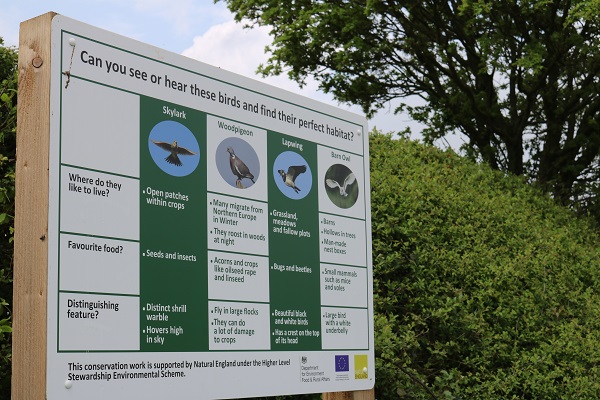
Many arable farmers do a staggering amount to look after the countryside that goes unrecognised or is misinterpreted.
He saw LEAF as the organisation to get a similar event started in the UK. “I was on LEAF’s Communications Committee and proposed the idea at a meeting in 2006. At first it got a lukewarm reception – quite understandable as it was March and the proposal was to have a summer event. But for me, it was a no-brainer – it was the right time and there an appetite in the industry to do something different.”
First Open Farm Sunday
So LEAF agreed to run a pilot scheme – a logo was made, sponsorship found and the organisation used its network and the farming press to get 150 farms involved in the first Open Farm Sunday in June that same year. “Without LEAF it would never have happened – they had the network through their Demonstration farmers and the right team of people to get it off the ground.
“Crucially, they gave it credibility – that’s not only within farming and Government organisations and with potential sponsors, but with the farmers themselves. LEAF has really changed how farmers feel about their responsibility to reconnect with the consumer and the opportunities that go with that.”
Following the immense success of the pilot, 400 farms got involved in the second year. “We wanted to get to 1000, but quickly realised it’s not about the number of farms. People are coming to an event because they want to meet a farmer. In year three, there were 7000 helpers involved in Open Farm Sunday events, and that’s what made it such a success, and continues to be the case today.”
Every other year, his own farm business hosts an event, which attracts several thousand visitors. “The venue is essentially a canvas on which everyone else paints – not everyone wants to host an event, but every farmer can contribute valuable content. Arable farmers worry that they don’t have enough to show visitors, but a grain store with a concrete apron is the perfect venue to fill with other people’s creative content.”
For his own event, an organisation committee and regular meetings tease the best ideas to the surface from those involved. “Again, what makes it a success is the team – last year we introduced pig racing, that was hugely popular, and we held a mock auction of livestock and farm equipment so visitors could guess its value and understand the level of investment farmers make.”
Farmer’s story
But most of all, visitors come because they want to hear the farming story from those who shape the countryside, he says. “It’s a compelling story and it’s a positive one. The food production and technology side is important, and quite interesting if told right. But I think they’re an expectation – the real interest lies in the countryside. As arable farmers, we do a staggering amount to look after it that goes unrecognised or is misinterpreted – people are really interested and this is our opportunity to present the truth.”
That doesn’t mean rolling out a soapbox, however. Ian Pigott’s philosophy revolves firmly around education. He’s the current chairman of FACE (Farming And Countryside Education) and points out the organisation’s value in reaching the audience that really matters. “Open Farm Sunday has a somewhat familiar visitor profile. FACE is about providing initial teacher training, resources and accessibility to farms for schoolchildren who wouldn’t otherwise see one.”
Despite its laudable aims, the charity faces hurdles, he explains. “These are not just financial. There’s also the logistical challenge of bussing schoolchildren around the countryside. Farmers who host school visits often find there’s a perception issue – many teachers don’t know enough about farming to appreciate the variety of learning a visit offers and relevance to the curriculum.”
So there’s now a purpose-built Farmschool at the business’ Annables Farm. The farm works with a number of schools from near and far and a trip to the farm and its specialist facilities form a firm fixture within the schoolyear for hundreds of children.
Farmschool classes
“We can take a whole year group and hold cookery classes, while the rooms are each big enough to teach 80 children. It’s also a base to explore things of interest that may be happening on the farm,” says Ian Pigott.
And this itself is going through quite a change – a year ago the farm invested £116,000 in a CrossSlot drill, in place of a 4m Horsch Sprinter, 7f Dowdeswell plough and 4.6m Simba Express. This is run across the 750ha core business, along with outlying farms on a contract basis. The cropping has also shifted with oilseed rape dropped and a range of spring crops following cover crops introduced.
“We established 730ha of cover and catch crops last autumn. This is the start of a trial and a journey for us – we’re working with Rothamsted to learn what the real soil health benefits are.
“With blackgrass and other arable challenges, it’s crystal clear we need to do something different, and the time is now right. This has a very different objective to Open Farm Sunday, but it’s similar in that you share your experiences and learn from others.”
And it fits neatly into the essential role Ian Pigott feels the farmer fulfils as custodian of the countryside – one that’s seldom given enough profile. “We have a comments board at Open Farm Sunday, where we encourage visitors to leave feedback. It’s clear from the comments we get that what they’ve seen has restored their faith, not only in farming, but in the society in which they live. It’s an intangible benefit, but it’s hugely rewarding knowing you’re delivering it.”
How to be an on-farm innovator – Ian Pigott’s top tips
- People are crucial. A good team, who are all part of the journey of what you’re trying to achieve, lie at the essence of any innovation.
- The timing must be right. Gauge the appetite of your audience for change – Open Farm Sunday would have failed if it had been introduced in 1996, rather than 2006.
- Credibility is important. Finding out what others are doing and learning from this gives you authority. This should then be articulated well.
- Use a good network. Work with organisations and people who share your values and can extend the reach effectively.
- Energy is vital. You must be genuinely passionate about what you are striving to achieve and determined to succeed, no matter what hurdles lie in the way.
- Address the finances. Money can often be the most difficult bit to get right. Don’t assume others will be prepared to pay – there should be a compelling story and the reward for them should be clear.
- Make it your own. Be clear about the reward you want personally from your innovation and it should always deliver for you on this – you should never feel resentful that you’ve worked too hard on behalf of others.
A clear vision delivered in the right way at the right time
There are two aspects of what Ian Pigott and his team have achieved that really stand out for Rob Gladwin, UK head of business development and sustainability at BASF.
“The first is clearly the progress made in bridging the disconnect between farming and the general public, both in terms of being the driving force behind Open Farm Sunday, and the work they do with schoolchildren,” he says.
“But they’ve also acknowledged the critical role of soil health and have committed to get behind the science. You feel that if they put the same energy and approach into this new venture, there’ll be benefits for the whole industry, and a pursuit perhaps all farmers should be considering.”
A lot of it comes down to timing, he says, and notes that one element of the initial success of Open Farm Sunday is that it tapped into the industry view at the time that ‘something had to be done’.
“What Ian brought was a very positive approach, and a clear idea of a concept that would address it. He understands his audience, and articulated his ideas effectively. The team approach taken to planning clearly works well, too, especially when it comes to keeping their Open Farm Sunday event fresh and enjoyable, as well as educational for visitors.”
But if there’s one element that stands out when it comes to how British Agriculture is perceived by the public, it’s the important role that farmers play in shaping it, stresses Rob Gladwin.
“One thing we’ve learned through our Biggest Job on Earth campaign and through BASF’s work promoting sustainability at Rawcliffe Bridge and The Grange is that the people who are most effective at giving consumers a better understanding of farming are the farmers themselves. So any farmer should have a go at helping to put out those positive messages.”
The “obvious” synergies between BASF’s sustainability work and Open Farm Sunday are why it’s one of the sponsors, he says, and the company offers host farmers help through providing resources and via its team of agronomy managers across the UK. The infrastructure and training offered by LEAF make it a tried-and-trusted event in the calendar and one the entire industry benefits from, he adds.
“It’s incredibly rewarding to inspire someone with the wonders of the countryside and the essential role farmers play in the production of food. Thousands of farmers will do just that for tens of thousands of visitors on 5 June this year.”
On-farm innovation
 Farmers are constantly innovating to improve their businesses, which is why BASF is committed to investing 10% of its sales revenues into R&D to deliver new technologies for farming. BASF’s new innovations include pioneering agricultural chemistry, as well as Innovations Beyond Crop Protection like biologicals, bacteria, soil and water management and renewable technologies. Our future is firmly focused on delivering towards farming’s future.
Farmers are constantly innovating to improve their businesses, which is why BASF is committed to investing 10% of its sales revenues into R&D to deliver new technologies for farming. BASF’s new innovations include pioneering agricultural chemistry, as well as Innovations Beyond Crop Protection like biologicals, bacteria, soil and water management and renewable technologies. Our future is firmly focused on delivering towards farming’s future.

